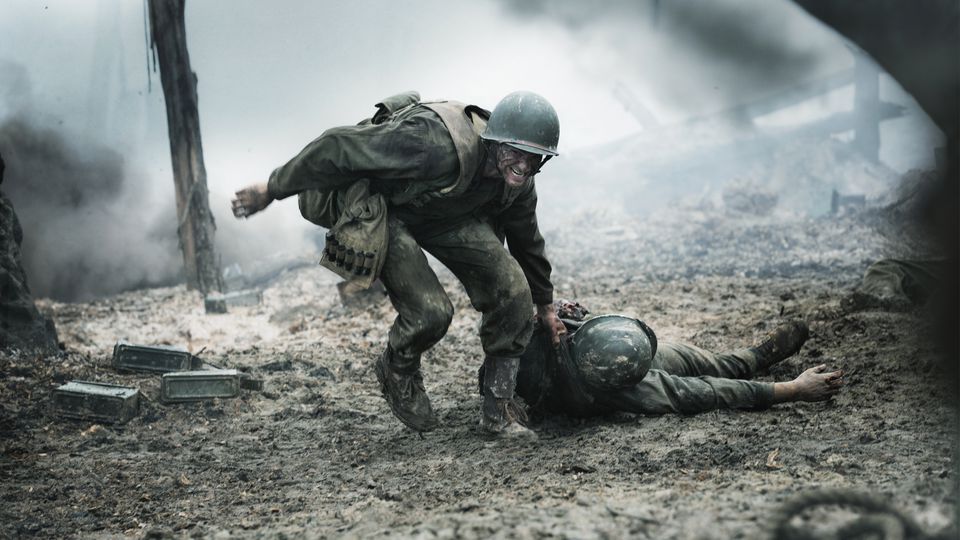Shipped to Okinawa, Doss and his company are brutally routed by the charging Japanese and forced down a sheer cliff face by overwhelming numbers. Given the choice of retreating himself or staying atop the cliff to rescue the wounded before they can be killed by the Japanese, Doss stays, single-handedly rescuing men from certain death at great effort and risk to himself. With a mantra of "Please, God, let me get one more," Doss hides from skulking Japanese soldiers, touts men on his back, and pulleys them down the cliff before heading back into the smoke-covered fray. By the time the Americans are able to assemble another push, he's rescued dozens of men, proving his worth to his formerly-skeptical comrades and earning himself a Medal of Honor back home.
Doss the man is a truly impressive figure, with a humility to match his bravery. Gibson includes footage of him over the credits, discussing an anecdote from Okinawa. During his rescues, he came upon a dazed man who thought he was blind, when in fact his face was only covered in mud. Doss washed his eyes out with his canteen, and he describes the subsequent smile on the soldier's face as something that carries a deep significance for him. The experience of seeing this interview is more emotionally powerful than anything in the battle sequences. Even the scene that Doss describes makes no impact, as Gibson films it perfunctorily with none of the joy or revelation that the real Doss tells the story with.
Part of this may be due to the numbing effect of the combat. These scenes are unquestionably visceral with an impeccable sound design that teaches the viewer what to expect at certain explosions or firings. Gibson films parts of the battle as a horror film, as nervy and tense as any haunted house. Soldiers die bloodily with no fanfare or last words, unless those last words are garbled agony. When the two armies are clashing, the field turns into a meat grinder with no allowance for strategy beyond forward momentum. I have little patience for war scenes that are anything but cruel and random and ugly, all of which I equate with realism, and by that measure, Gibson may as well have filmed a documentary. This striving for bloody accuracy runs headlong into the aforementioned camera tricks, which instantly distract from the immersion. The whole experience is exhausting, such that there might be nothing left in the tank when it comes time for Doss to start rescuing.
While the most memorable parts of Hacksaw Ridge take place in the Pacific, half of the film goes by before the characters leave the country. The training camp scenes are fine, if indistinctive. The most noticeable aspects are that Gibson has cast the company solely with men well into their thirties, Worthington is still an actor who exists, and Vaughn gets a bit of redemption after his True Detective stint. In the first act, Lynchburg, VA is shown to be a sun-dappled Appalachian paradise, where everyone talks with the cadence of a twangy Walton family. If the purpose was to create the furthest possible distance between America and Okinawa, then Gibson oversucceeds. These scenes are fairly laughable, especially a tacked-on romance between Doss and Teresa Palmer's Dorothy, but there's one exception. Hugo Weaving is fantastic as Doss' mess of a father. An utter wreck of a man who tearfully visits the grave of his friends killed in the trenches, he is affecting in a way that suggests a far more subversive film. His presence gives the lie to everything in Lynchburg, that behind all these sunny exteriors is trauma begetting trauma. Gibson and writers Robert Schenkkan and Andrew Knight don't do enough with his character, but his performance looms over the rest of the film, a specter of what Doss could turn into after he comes back home.
If the cornpone wholesomeness was turned down and the war scenes were filmed without extraneous bells and whistles and I was invested in Doss' rescues because I was invested in the other soldiers he served with, Hacksaw Ridge would be able to stand with some of the best WWII films in recent memory. Garfield admirably plays Doss as more than a saintly figure, repeatedly having to tamp down the rage he knows he has inside of him. This is also more than a straight biopic, with intriguing threads of how Doss' valor is perceived by his company and a thin interrogation of what would make a man do something as horrific as some of the onscreen acts (this only applies to the Americans, as the Japanese are nothing but reckless and cruel, and the racist nature of the Pacific theater is also elided). Gibson has certainly retained his touch for action filmmaking, but he could spread some of the magic he got out of Garfield and Weaving onto the rest of his cast. Equal parts risible (hoo, that final shot) and powerful, with a touch of pathos, Hacksaw Ridge is no Saving Private Ryan, but it's no Windtalkers, either. C+

 RSS Feed
RSS Feed